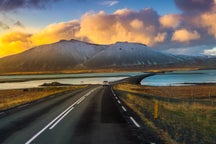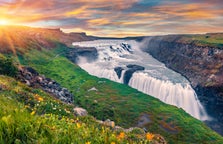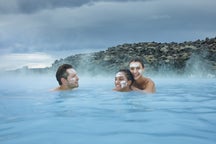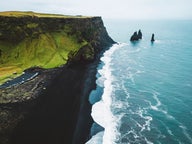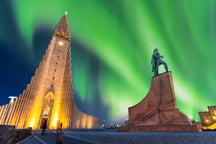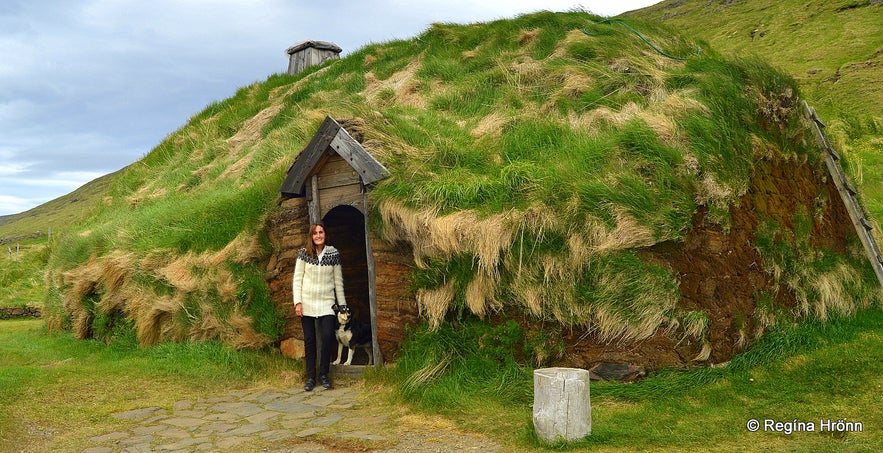
Have you ever wanted to see how the Vikings lived? You will get the opportunity to do so in West Iceland, where you will find a hypothetical Viking longhouse.
It is called Eiríksstaðir, and I visit it every time I travel to this area.
I am stepping back in time when I visit this longhouse.
Top photo: Eiríksstaðir back in 2015
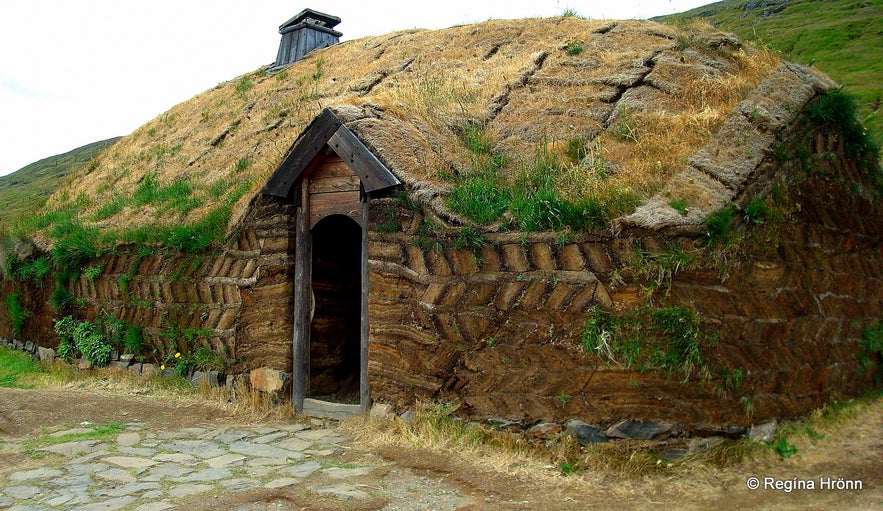
Eiríksstaðir in 2010
The Vikings started coming to Iceland to settle here around 874, give or take a couple of years.
So, naturally, many areas in Iceland are rich in Viking history. And Eiríksstaðir in West Iceland is pure Viking :)
The Viking longhouse at Eiríksstaðir is a hypothetical house of the old Saga age longhouse where Eiríkur rauði - Erik the Red (died approx. 1006 in Greenland) and his wife Þjóðhildur lived.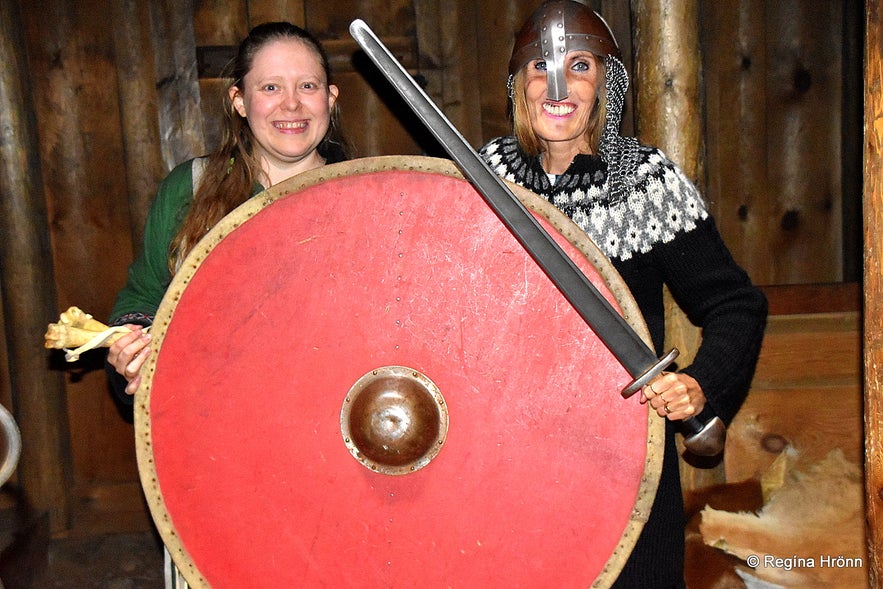
Our lovely, very knowledgeable guide in 2019 at Eiríksstaðir - I do NOT look good in a helmet ;)
Erik the Red and his father, Þorvaldur, had to leave Norway because of killings and first lived at Drangar in Hornstrandir, where his father died.
Eiríkur then married Þjóðhildur and moved to Eiríksstaðir. But he was chased out of Eiríksstaðir for the killings of Eyjólfur saur and Hólmgöngu-Hrafn, as you can read about in both Grænlendingasaga (Icelandic) and in The Saga of Erik the Red.
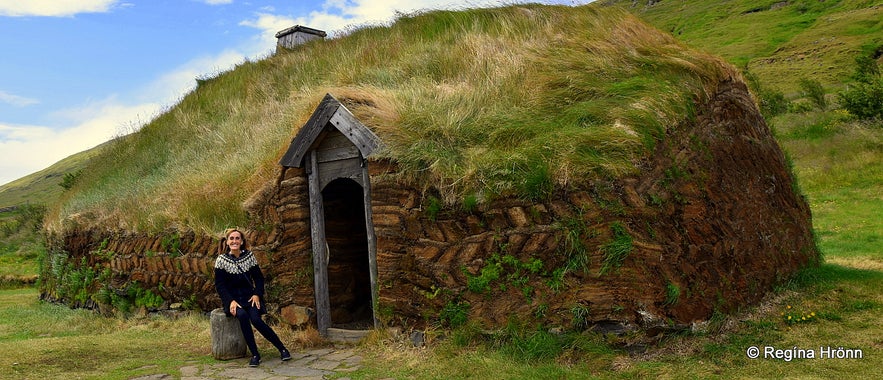
Eiríksstaðir in 2019
He, therefore, went to live at Eiríksstaðir on the Öxney (Yxney) island in the Breiðafjörður islands.
He then fought with Þorgestur at Breiðabólstaður at Skógarströnd and killed two of his sons and other men, and was found guilty at Þórsnessþing district parliament. You can read about Þórsnessþing in Eyrbyggja Saga.
Eiríkur prepared a ship in Eiríksvogur and sailed for Greenland, but he had heard about this land called Gunnbjarnarsker, which Gunnbjörn Úlfsson had seen.
He stayed in Greenland for 3 years, then came to Breiðarfjörður for a visit and stayed in Iceland for one winter. 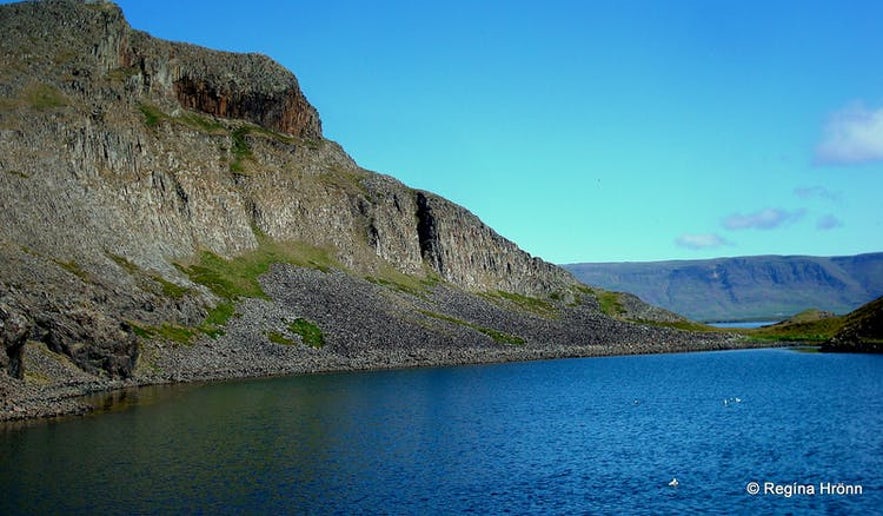
Breiðafjarðar islands in West-Iceland
He then returned to Greenland and lived at Brattahlíð in the Eiríkssfjörður fjord, where he was highly respected.
Eiríkur gave Greenland its name to encourage people to move there. That name was quite a contradiction, as Greenland is almost covered in ice.
According to Grænlendinga Saga, 25 ships left Iceland for Greenland in the year 985, but only 14 ships managed to reach Greenland.
Eiríksstaðir might be the place where the son of Eiríkur and Þjóðhildur, Leifur heppni - Leif the Lucky (around 970- 980 to 1020) was born.
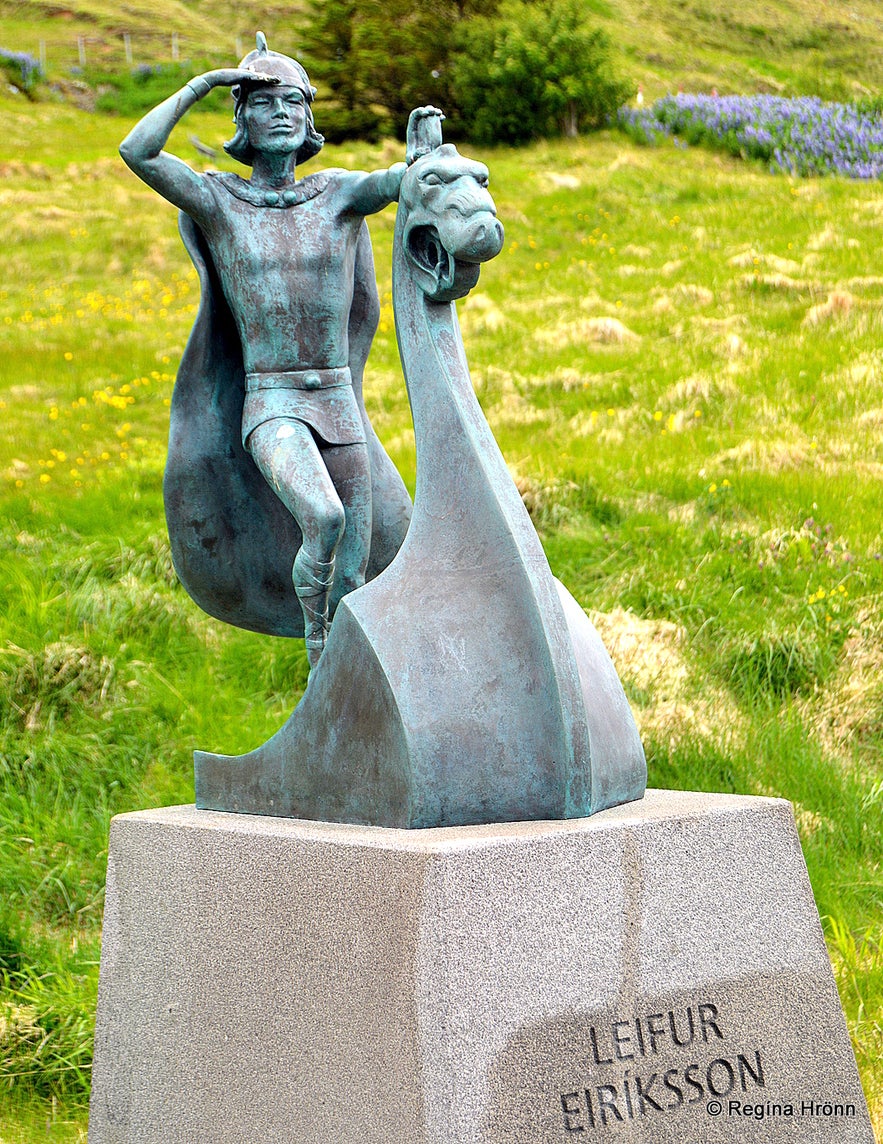
The statue of Leifur at Eiríksstaðir
Leifur had heard of a land further west that Bjarni Herjólfsson had seen when he got lost on his way to Greenland. Leifur wanted to know this land and bought a ship from Bjarni.
Leifur left Greenland and sailed to North America. He was the first European to land there; thus, it is said that Leifur "discovered" America, not Columbus in 1492, nor Bjarni, as he had only seen this land and not set foot ashore.
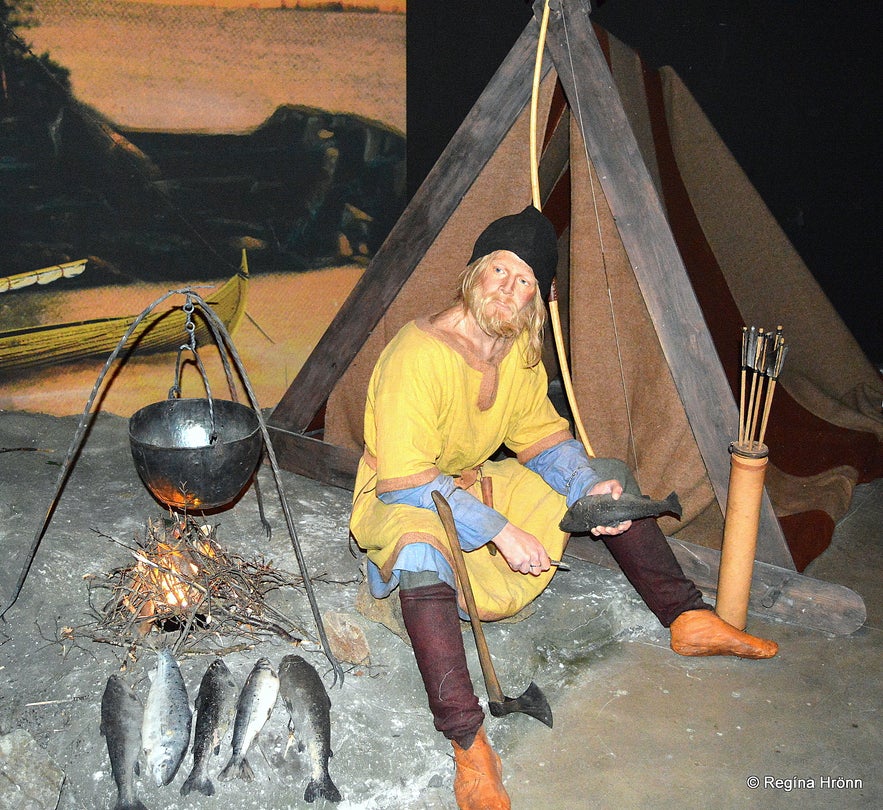
Leif the Lucky, as depicted at the Saga Museum in Reykjavík, which I also recommend visiting
Leifur named this land Vínland or Wine country, as they found grapes there. They built a longhouse and stayed for one winter, and then sailed back to Greenland the following spring with a ship filled with grapes and wood.
On his way back to Greenland, Leifur rescued 15 men (and women) from a reef and got the nickname "heppni" or "the lucky".
Amongst them were Þórir Austmaður and Guðríður; Þórir was the first husband of Guðríður Þorbjarnardóttir, who was later to become Leifur's sister-in-law when she married Þorsteinn Eiríksson after the death of Þórir.
See also my travel blog about Guðríður, the most widely travelled woman of the Middle Ages.
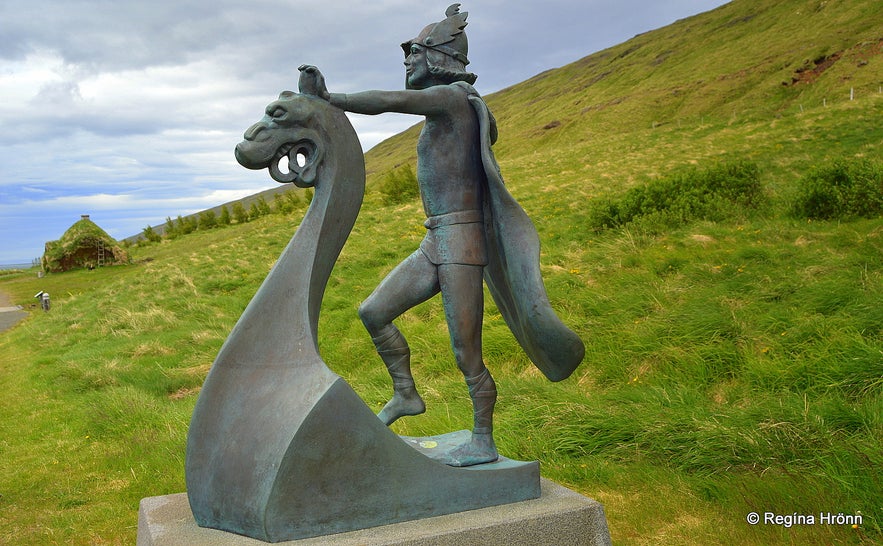
The statue of Leifur heppni - Leif the Lucky at Eiríksstaðir
Leifur became a missionary in Greenland at the command of the Norwegian king Ólafur Tryggvason. His mother built the first church in Greenland, Þjóðhildarkirkja church, which was named after her.
But his father, Erik, never converted to Christianity.
Leifur had three siblings, Þorsteinn, Þorvaldur, and Freydís, who all wanted to see Vínland and the Sagas tell us about their journey and adventures there.
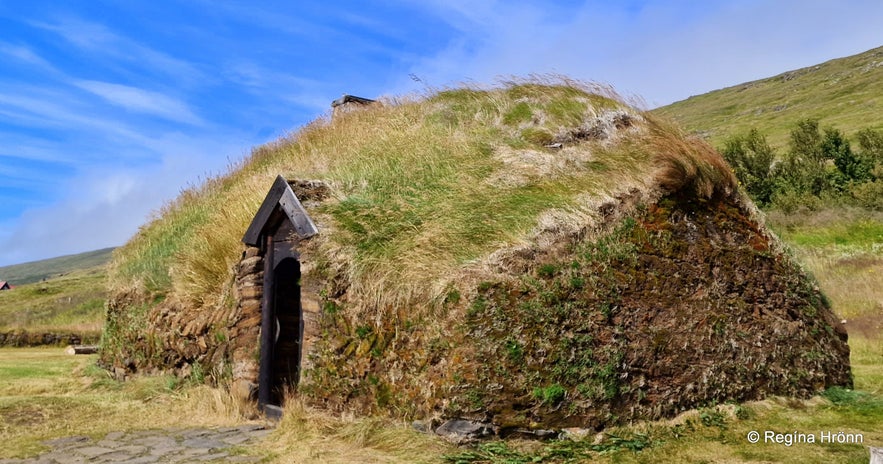 Eiríksstaðir in 2023
Eiríksstaðir in 2023
According to Grænlendingasaga, Þorvaldur died in Vínland (was killed by the natives), and Þorsteinn, who wanted to fetch his brother's body in Vínland, got lost on his journey and never reached Vínland.
Þorsteinn and Guðríður Þorbjarnadóttir arrived at Lýsufjörður in Greenland, where they stayed with Þorsteinn svarti. Here, Þorsteinn Eiríksson died of a contagious illness, and Þorsteinn svarti's wife also caught this illness and died.
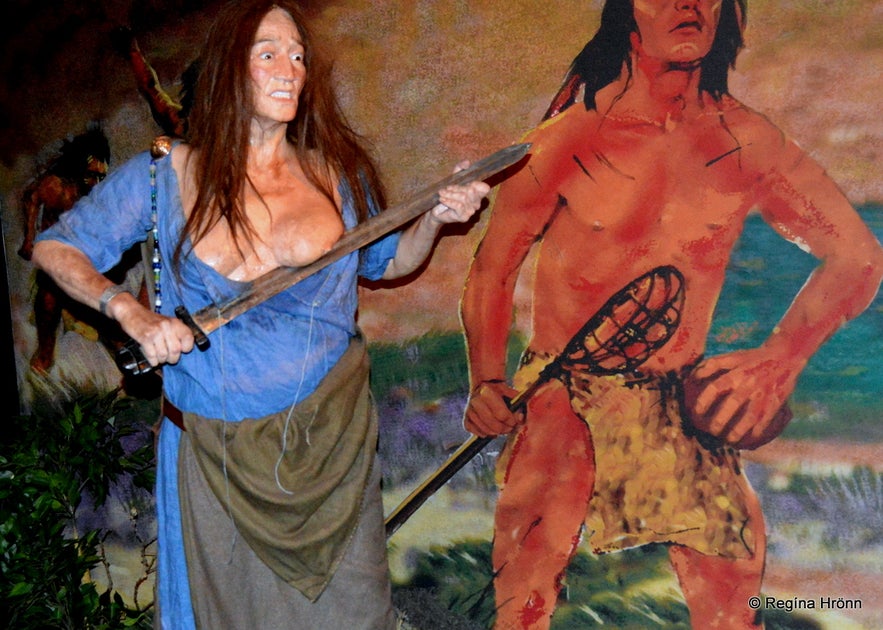
Freydís Eiríksdóttir as depicted at the Saga Museum in Reykjavík - an event from Eiríks Saga
Guðríður later married Þorfinnur karlsefni, sailed with him to Vínland, and gave birth to the first European child, Snorri, there.
There are different accounts of their adventures and fate in Eiríks Saga and Grænlendingasaga, so it is best to read both of them (short Sagas) if you want to know more about what happened to Eiríkur, Þjóðhildur, and co. I prefer Grænlendingasaga, but there are also interesting accounts in Eiríks Saga, so they complement each other.
The story of Freydís, their sister, is also very different in these 2 Sagas. In Grænlendingasaga, she is depicted as a true villain, whereas in Eiríks Saga, she has a minor role. One account shows her pregnant in a strange situation in Vínland, as you can see in my photo above, which I took at the excellent Saga Museum in Reykjavík.
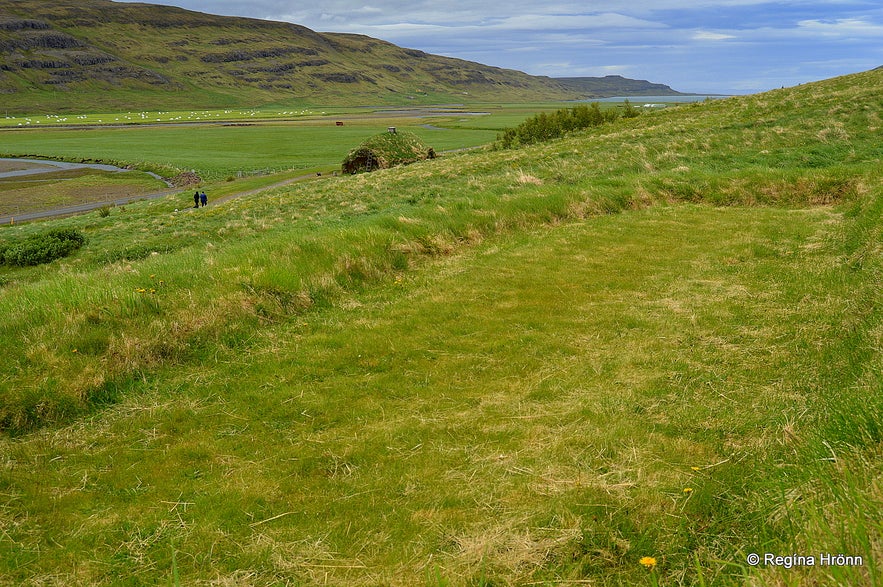
The ruins of the old longhouse
At Eiríksstaðir, you can walk up to the ruins of the more than 1000-year-old lodge, and you will find a statue of Leif the Lucky close to the ruins.
It is believed that these people lived in this longhouse until around 980.
The ruins were covered with grass after the archaeological excavation, so many people don't know about them. On this spot, the longhouse of Erik the Red was most likely located.
The Saga age-longhouse was opened in 2000, some 100 metres from the ruins of the original longhouse. 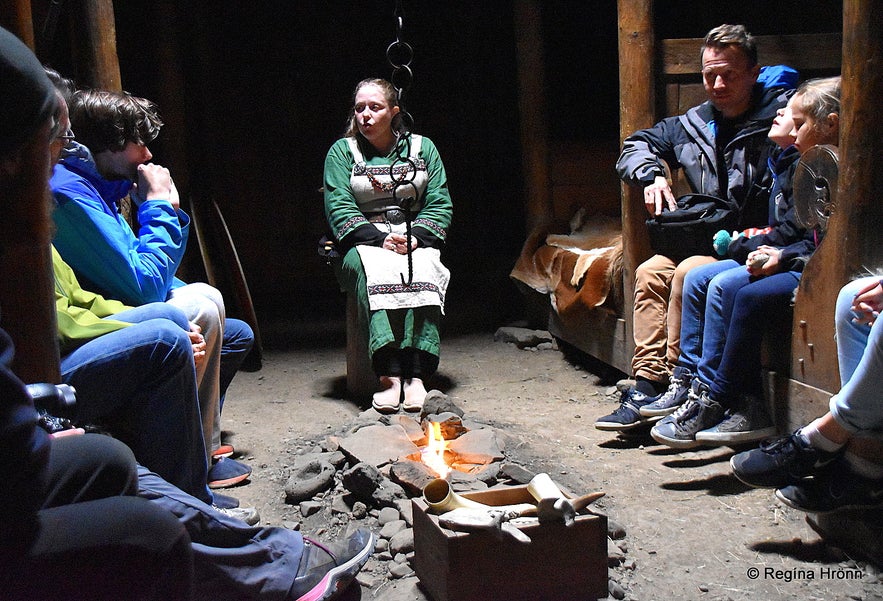
Storytelling by the longfire at Eiríksstaðir
At the same time, the replica of a Viking ship, Íslendingur - the Icelander, set off for America in the trails of Leif the Lucky 1000 years earlier.
The longhouse is built with a remake of old Viking tools and is said to be the best-built longhouse in all of Europe.
It is a very cute longhouse with a fire burning inside, like in old Viking homes.
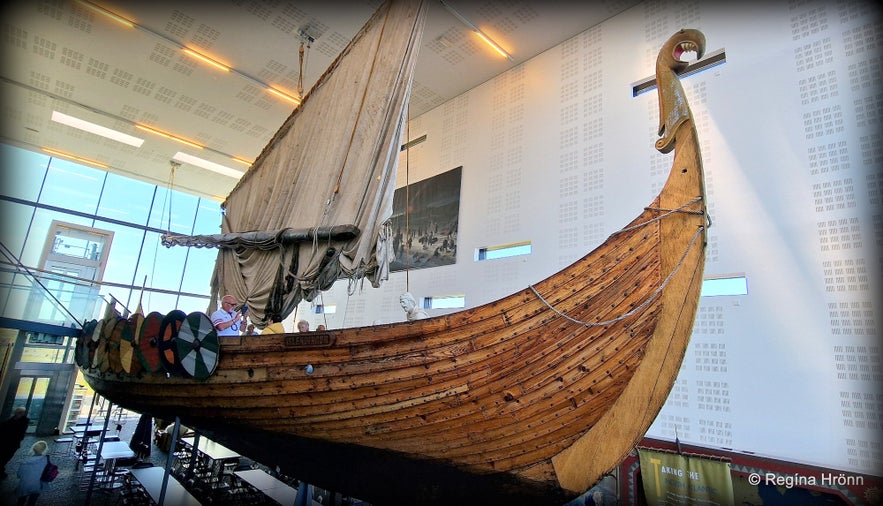 The ship Icelander at the Viking World
The ship Icelander at the Viking World
The staff is dressed in Viking costumes, a "knock-off" of the 10th-century Viking fashion.
Inside the longhouse, they told us the story of the Vikings, who lived in this area. We were also shown a pair of Viking bone skates.
We got to dress up like Vikings and try the Viking weapons, and you can get some great photos at Eiríksstaðir.
Notice that the helmet is hornless; most people believe that Viking helmets had horns, but that is not true. No Viking helmets with horns have been found.
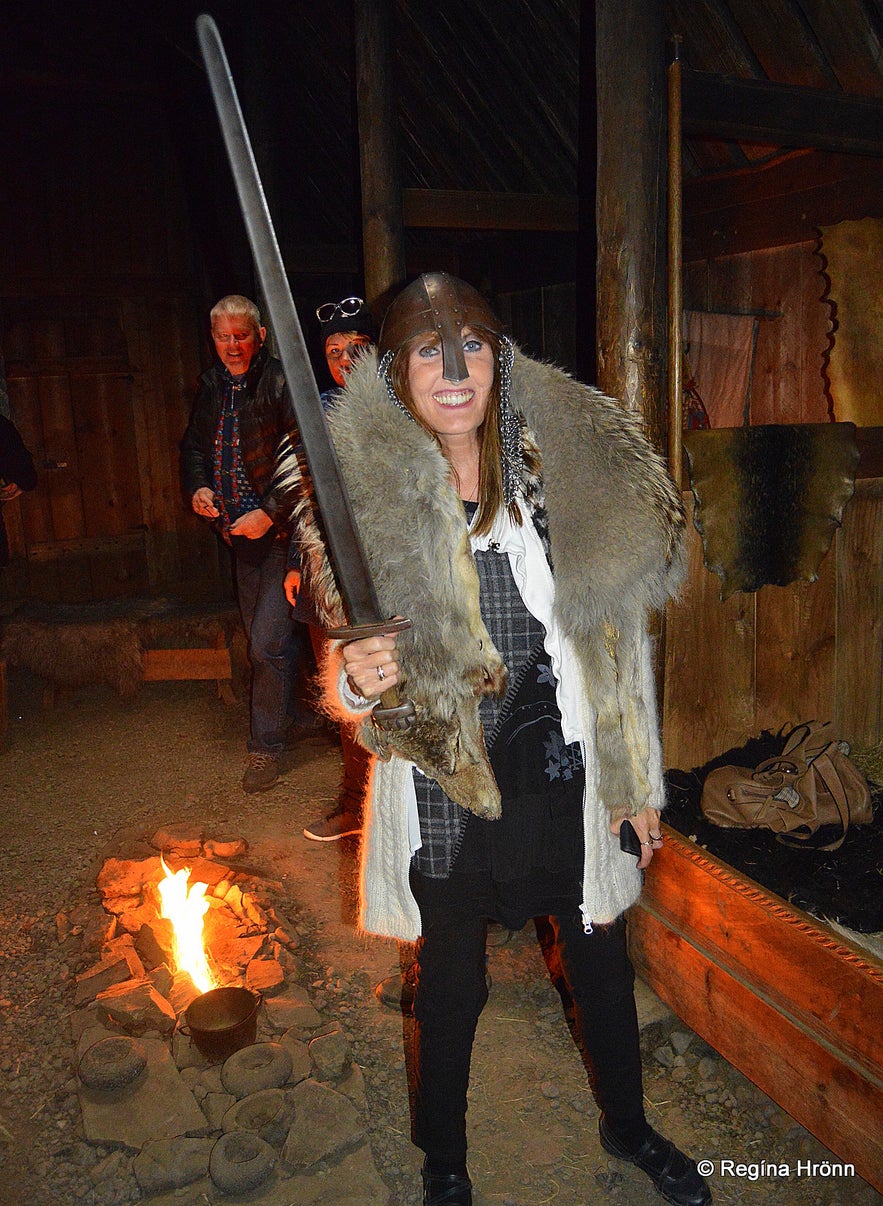
From my visit to Eiríksstaðir in 2015
The Vikings used horns for drinking and made tools from them, but they didn't put them on their helmets.
And the ordinary Viking didn't even own a helmet, since the metal used in them was costly.
They have, e.g., examined the lives of the settlers of Iceland, how they made iron, and which herbs were used to colour clothes. And how long did their shoes last in Iceland, and if the light from the oil lamps cast enough light for weaving?
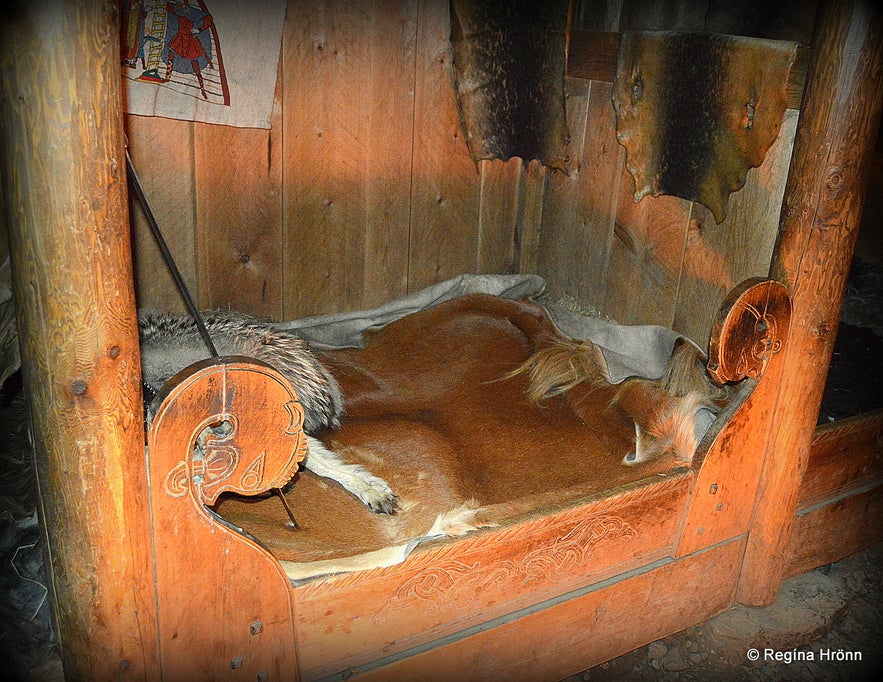
One of the beds at Eiríksstaðir
The storyteller told us the story of Eiríkur rauði, Þjóðhildur, and Leifur, and how the Vikings lived and worked in the longhouse.
There was a long fire in the middle of the longhouse, and the Vikings slept sitting in an upright position so as not to choke from the smoke from the fire, the storyteller told us.
The most ornate bed belonged to the masters of the house, and the servants slept in beds that had a lower front than that of the masters of the house.
The virgins slept in the attic (see the photo below) where they were protected from the men.
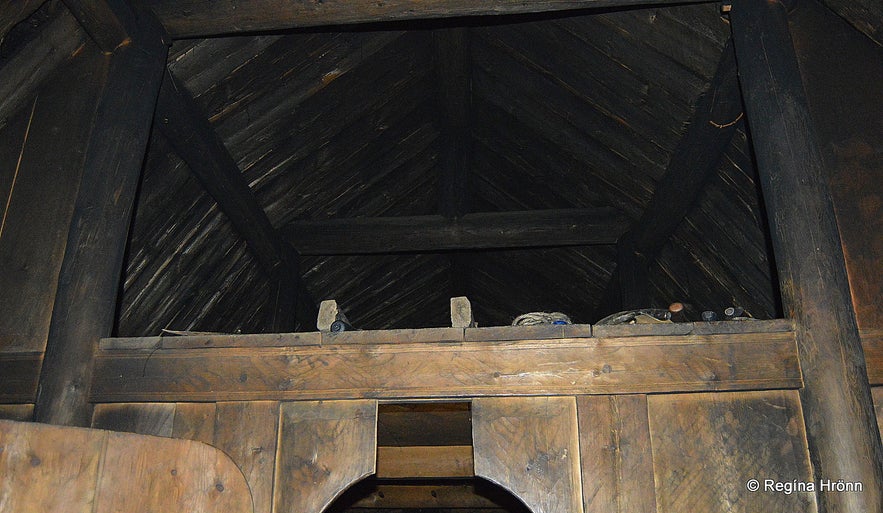
It is believed that around 20 people were living in this house at the same time, so it must have been crowded! And then sometimes groups of winter guests stayed there as well - for the longest time!
The women in Iceland held power, as you can read in the Icelandic Sagas. Or at least some of them did.
And the women had the key to the pantry, and there the men were not allowed to go, as the Viking men were known to eat everything at sight, much as our men today ;)
At Eiríksstaðir, the role of women is emphasized, but their essential contributions are often overlooked, while the focus is entirely on Viking men.
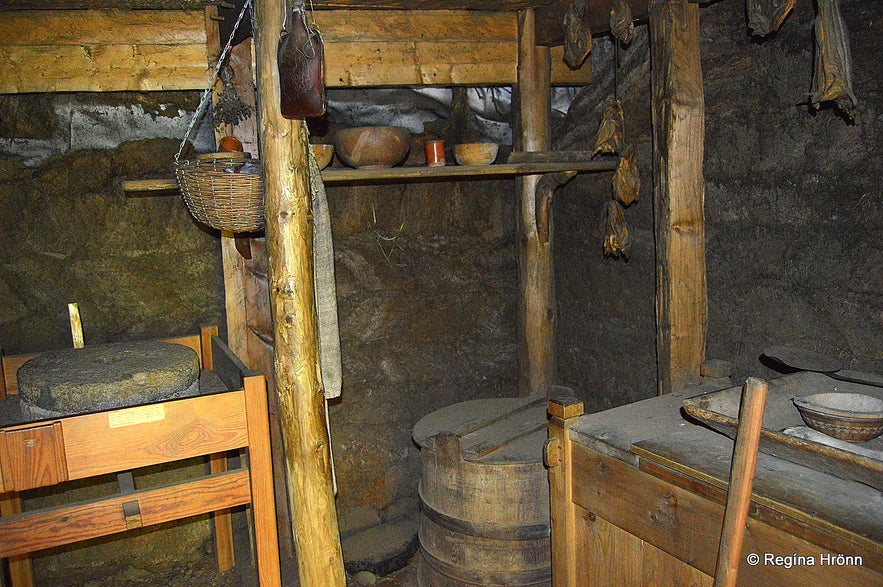
The pantry
In 2019, Eiríksstaðir gained new proprietors and added a food truck offering traditional Icelandic cuisine.
It is called Þjóðhildarpotturinn or the Kitchen of Erik the Red, and here you can buy food from the 21st century as well as Viking-style food from the 10th century. They offer, e.g., traditional meat broth, smoked trout, and cured lamb.
If you are not into that kind of food, then they also offer sandwiches :)
The new proprietors have many good ideas for making the best use of Eiríksstaðir. A Viking festival is planned for the last weekend in August. You can follow Eiríksstaðir on Facebook and join the festival.
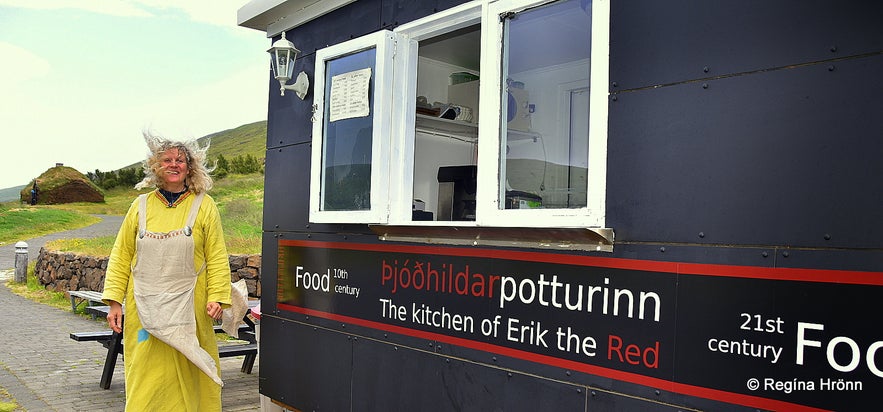
The food truck and the lovely Viking woman serving food - it was very windy during my last visit to Eiríksstaðir.
It is so worth visiting this lovely Viking longhouse while travelling in West Iceland. I always feel like I have stepped into the Viking ages when visiting Eiríksstaðir longhouse. So don't miss it if you would like to experience the Viking side of Iceland.
I have written other travel blogs about Viking activities in Iceland if you want to get acquainted with the Vikings in Iceland, for example:
Unleash your Inner Viking Warrior with a Professional Viking Portrait in Reykjavík
The Icelandic Vikings and Viking Activities in Iceland today
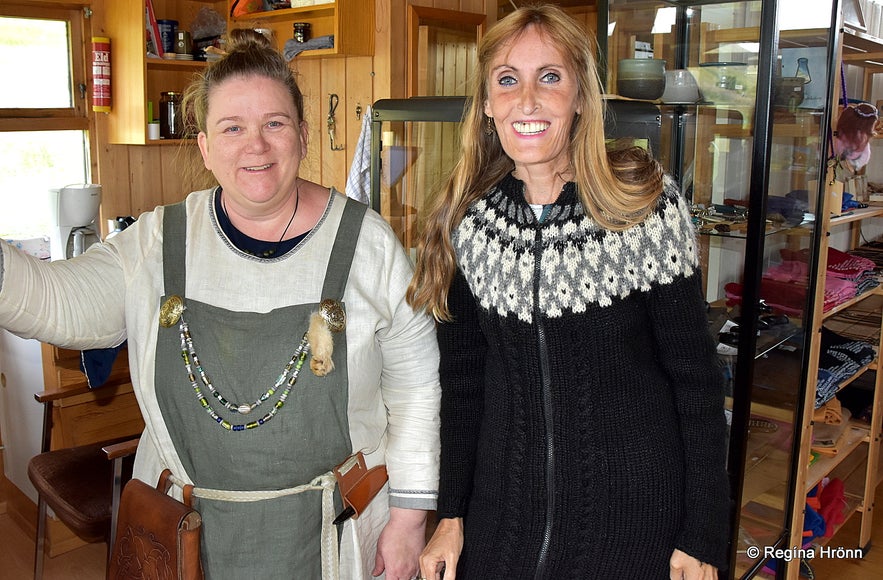
With Bjarnheiður Jóhannsdóttir, one of the new proprietors of Eiríksstaðir
Eiríksstaðir is open daily from May 1st until September 30th, from 09:00-17:00 (9 am-5 pm). There is an entrance fee for adults, but children enter the longhouse for free.
Guidance and storytelling by the long fire is offered every half an hour. Tickets are sold at the ticket office by the car park. In the wintertime, pre-booked groups can visit.
For more information, check out their website Eiríksstaðir.
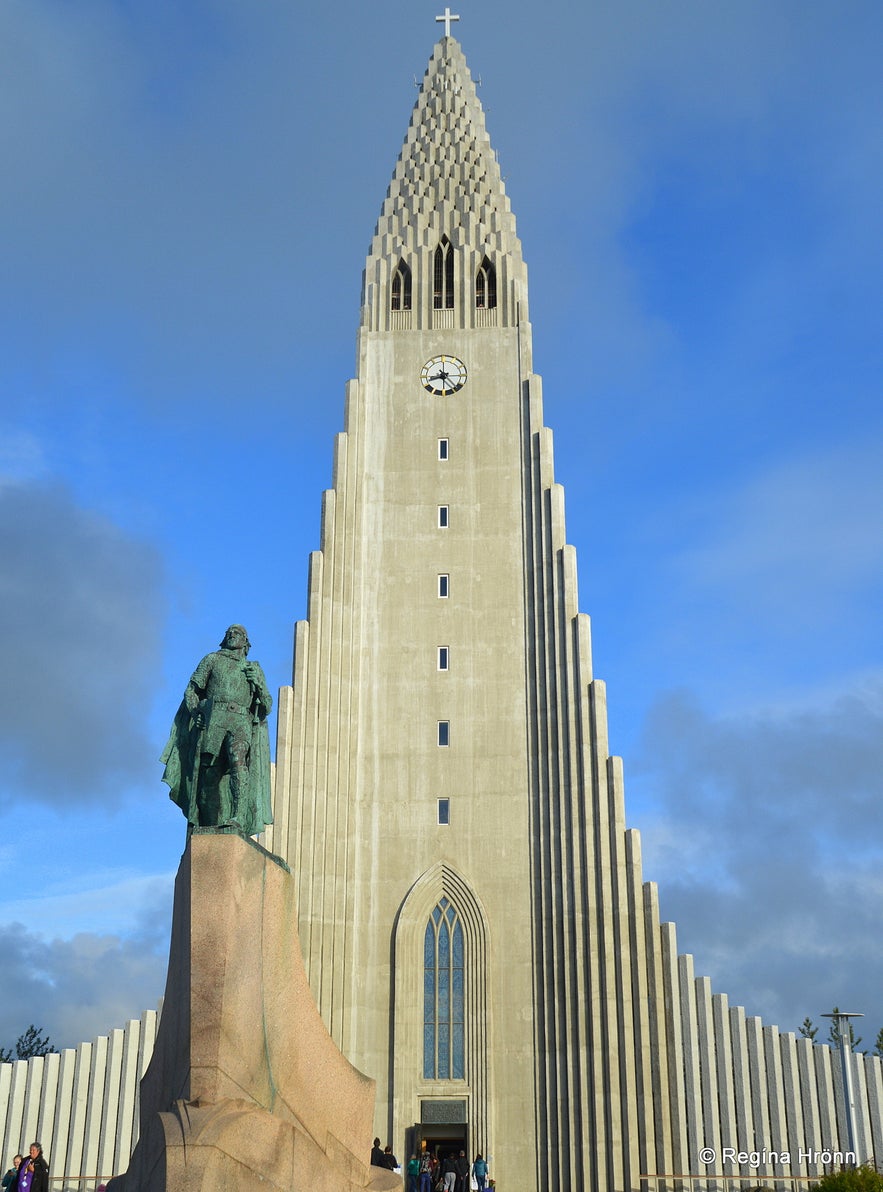 The statue of Leifur Eiríksson in front of Hallgrímskirkja church in Reykjavík
The statue of Leifur Eiríksson in front of Hallgrímskirkja church in Reykjavík
Eiríksstaðir longhouse is located in West Iceland, 76 km north of Borgarnes on the way to the Westfjords. From Borgarnes, drive on Ring Road 1 north towards Akureyri, and turn left onto Road 60 heading towards Hólmavík.
To visit Eiríksstaðir, you can rent a car and drive to West Iceland.
Turn right onto road 586 (before reaching Búðardalur) and drive for 8 km into Haukadalur past a lake until you see Eiríksstaðir on your left-hand side. On the junction of roads 586 and 60, you will see a sign above. "Eiríksstaðir fæðingarstaður Leifs heppna" means Eiríksstaðir the birthplace of Leif the Lucky.
The closest village is Búðardalur, which is 15 km away. Here is the location of Eiríksstaðir on the map. GPS: 65°03'32.9"N 21°32'20.4"W
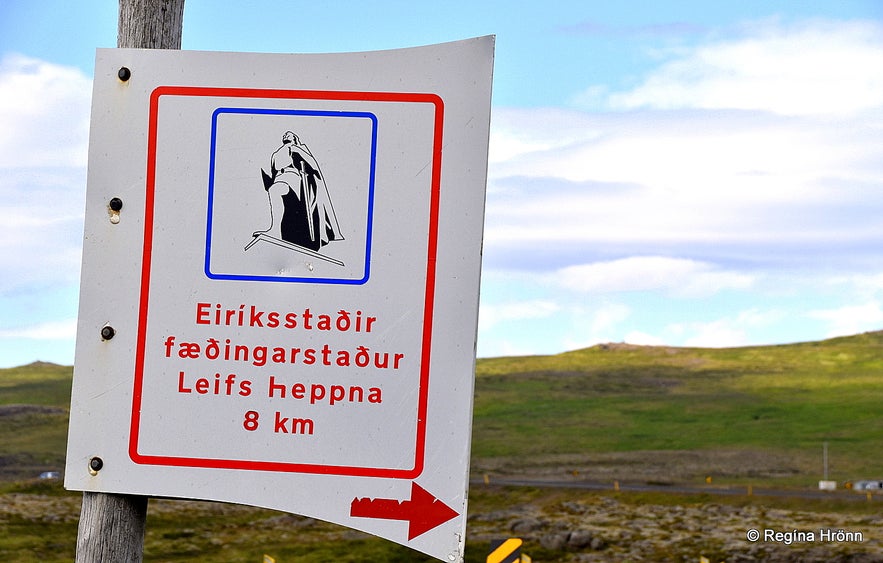
Evidence for European presence in the Americas in AD 1021
The travel blog on Eiríksstaðir Viking Longhouse is my second travel blog here on Guide to Iceland, written back in 2013, but I update it regularly. Since then, I have written 320 travel blogs on various locations and activities in my country.
Have a lovely time exploring the Viking areas of Iceland :)
Sources:
Grænlendingasaga (Icelandic)








